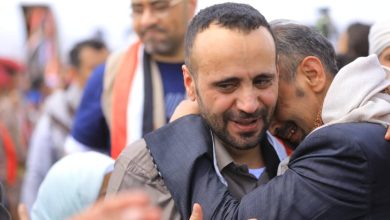
Yemen Monitor/Investigations Unit/Private:
The most mysterious of the leaders of the Houthi group, and the most faithful to the idea of the group and restoring the authority of the “Zaidi state/imamate” in Yemen, is the second man after Abdulmalik al-Houthi, despite attempts to shake their relationship, but it has stood firm throughout the wars they have fought together.
Abdullah Yahya Al-Hakim (Abu Ali) (1985) is the head of the Houthis’ military intelligence, involved in most of the most strategic and secret issues of the Yemeni rebellion movement for nearly two decades. His tasks are a mixture of internal security for the group, both tribally and militarily, and external intelligence, from weapons technology to smuggling equipment, and securing the movement of foreign experts in Yemen, including Lebanese and Iranians.
This report explores the roles of “Al-Hakim” over the past two decades, relying on information obtained by “Yemen Monitor” from informed sources linked to his main tasks, and others from open sources that talked about the man known by his epithet Abu Ali.
The Rise
According to “Yemen Monitor” sources, Abdullah Al-Hakim, who hails from “Dhah’yan” directorate – near the Saudi border – was a student and member of the Believing Youth Organization in the 1990s. He received his education in the Zaidi madrasas in his hometown of Sa’adah Governorate, and then was a Quran teacher for Zaidi children within the sectarian organization. In 2004, he moved to support “Hussein Al-Houthi” at the beginning of the first war and was arrested by the Yemeni security forces. He was placed in the criminal investigation department in Sana’a, but he later escaped during a family visit, where he changed his clothes and left the prison to move to Sa’adah, where he began his journey of rebellion.
Although Abdulmalik Al-Houthi, who took over the leadership of the movement in 2006, preferred to keep the comrades of his brother, the founder of the group (Hussein), in the membership of the leadership, considering them the most loyal and experienced team in wars, such as Yusuf Al-Madani (married to Hussein Al-Houthi’s daughter). However, he gradually began to remove some tribal leaders in favor of the Hashemite Sayyids, such as Abdullah bin Aydah Al-Razami, who was Hussein’s Al-Houthi right-hand man in the first war (2004).
By the end of the sixth war in 2010, Abdulmalik had built a cohesive and trustworthy leadership group – all young men in their late twenties and early thirties, mostly from the Believing Youth Movement, largely related by kinship and region, and who shared their early upbringing in the six wars, such as his brother Abdul Khaliq and Muhammad Ali Al-Houthi, one of his cousins. From outside the Sayyid class appears Abu Ali Al-Hakim – and many believe that Al-Hakim is from the Hashemite Sayyids, but three sources close to the movement’s leaders in Sa’adah deny his affiliation with it – whom many researchers refer to as an alternative to “Abdullah Al-Razami”.
Leadership Roles
“Abu Ali Al-Hakim” rose to prominence after 2011, playing a pivotal role in consolidating the Houthis’ ambitions – what he described to his comrades as restoring the Zaidi state – after the Yemeni Spring uprising. He led the siege of the Dammaj area that year, which lasted 79 days and ended with an agreement that Abu Ali Al-Hakim was one of the signatories. He then expanded in the following two years towards Hajjah Governorate, the rest of Sa’adah Directorates, and attempts to expand towards Al-Jawf and even Marib.
During this period, Abu Ali Al-Hakim overcame his rival Yusuf Al-Madani as the second man to Abdulmalik Al-Houthi, who brought him closer. In addition to bringing Yusuf’s brother “Taha Al-Madani” closer as key field commanders, the movement’s leader also adopt the ambitions of Yahya Al-Razami (Abu Abdullah), the eldest son of “Abdullah bin Aydah Al-Razami” in an attempt to remove the tension with his father, who was excluded from the movement’s leadership.
In 2014, Abu Ali Al-Hakim led the Houthis’ battles against the Yemeni army in Amran Governorate, where the commander of the 310th Brigade, Brigadier General Hamid Al-Qushibi, was killed. The battles ended with the Houthis’ control of the governorate’s center, “Amran City,” and with that it was a matter of time before they reached Sana’a.
He also played a leading role in the invasion of the capital Sana’a in September 2014. For this reason, his name was included in the sanctions list imposed by the UN Security Council on November 7 of the same year, in addition to Ali Abdullah Saleh and Abdul Khaliq Al-Houthi (the brother of the Houthis’ leader), for threatening peace and stability in Yemen.
Controlling the Tribes
By tracking Abu Ali Al-Hakim’s internal meetings and roles, it is noticeable that he has an unparalleled record of dealing with tribal sheikhs and men and mobilizing them for the group’s goals. The leader was granted extensive powers to deal with security matters with tribal leaders, and powers to deal with internal security tasks.
As a result of this role, the Security Council imposed sanctions on him, as he was accused of holding a meeting with tribal leaders, military and partisan figures loyal to Ali Abdullah Saleh in order to overthrow the then-President Abd Rabbuh Mansour Hadi and coordinate efforts to control Sana’a[1].
Abu Ali Al-Hakim controlled the tribes around Sana’a at the height of the Houthis’ differences with Ali Abdullah Saleh, using a mixture of threats of destruction and appeasement. He pushed the sheikhs to calm “Saleh’s” revolt against the group and repeatedly demanded that they take a stand against “Saleh’s” coup against his agreements with the group; and with the increase in tension, “Al-Hakim” put most of the tribal sheikhs under house arrest in their homes in their tribal centers, imposed a siege on them, and raided their homes in Sana’a at the height of the clashes with “Saleh”[2], and led the fight of the tribes that tried to enter Sana’a until Ali Abdullah Saleh, the Houthis’ ally, was killed in December 2017.
Abu Ali Al-Hakim is considered responsible within the Houthis for security matters with the tribes, including resolving the movement’s disputes with the tribes. He also carries out tasks of dismantling the tribal decision to push it to neutrality from supporting another tribe or avoiding fighting in its areas[3]; or mobilizing among the tribes to fight against the tribal areas under the control of the internationally recognized government, such as mobilizing the war in Al-Jawf Governorate and pushing its tribes to facilitate their way to control its directorates, mobilizing in 2021 to invade Marib Governorate[4] and dealing with the tribes after the group’s control of their areas to prevent the threat of the existence of his group or a tribal uprising in those areas[5][6].
An official in Sana’a tells “Yemen Monitor”: “Abu Ali Al-Hakim is the perfect person for tasks related to the tribes because he is a tribal and not from the Hashemite Sayyid class (who dominate the group), which makes his talk, threats and dealings with tribal sheikhs less sensitive and capable of overcoming problems.”
Military Roles
In addition to the group’s internal security, Abu Ali Al-Hakim took over the supervision of what was known as the Republican Guard Brigades loyal to Saleh (changed to the Presidential Protection Brigades after 2012), after the control of Sana’a, and worked to dismantle this experienced fighting and control force, which was considered the elite of the elite in the Yemeni army and was led by the sons and relatives of Ali Abdullah Saleh.
Abu Ali Al-Hakim imposed the recruitment of Houthi fighters in the “Republican Guard” and their training by the elite of the elite, and alongside the current commander of the Presidential Protection Brigades (Abu Muhammad Al-Razhi) Abdullah Al-Hasani, he targeted the recruitment of officers from the Republican Guard and pushed them to attend Hothi cultural courses throughout the years. The new recruits and Houthi supervisors in the battalions, brigades and weapons stores contributed to preventing the intervention of forces from these brigades in support of the former Yemeni president in (2017) as they were under the command of “Tariq Saleh” who later fled after the killing of his uncle.
Abu Ali Al-Hakim currently heads the Military Intelligence and Reconnaissance Authority affiliated with the Ministry of Defense, and according to the sources that spoke to “Yemen Monitor”, Abu Ali personally supervises the selection and securing of advanced weapons factories, their establishment and supply of their needs according to the weapons technology that was provided to him by the Revolutionary Guards. He also supervises advanced weapons stores such as ballistic missiles, cruise missiles, and drones.
He receives orders from the head of the group regarding the military strategies announced by the group, which launched the names of some years for military industries in the past decades, including the group’s strategy in developing drones, ballistic and smart missiles, and maritime capabilities.
Red Sea Attacks
Abu Ali, who is on the US list of global terrorism, is believed to be responsible for a series of naval and air strikes against shipping in the Red Sea and hostile operations against Saudi Arabia. US believes that “Al-Hakim” is a key figure behind the attacks launched by the Houthis last November, which have so far targeted more than 100 commercial ships.
A year before the start of the naval attacks (November 2022), Al-Hakim announced his intention to prepare about 10,000 fighters for large-scale naval operations in the Red Sea against the Saudi-led military coalition in support of the internationally recognized government.
According to French intelligence “Intelligence Online”, the logistical support provided by Al-Quds corps of the Iranian Revolutionary Guard in the following year was crucial to Abu Ali’s operations in the Red Sea.
Hezbollah and Al-Quds corps
Information indicates the role of “Abu Ali Al-Hakim” in the most secret files of the Houthi group, such as Iranian weapons technology, smuggling weapons and experts to Yemen, and his body puts in place the paths and covers for the arrival of weapons to their areas after he communicates directly with officials in the Iranian Revolutionary Guards.
Abu Ali also appears in the role of a diplomat seeking strategies to face the challenges facing his group’s consolidation of its power. Including cooperation with the head of Syrian military intelligence, Kifah Al-Mulhem, (November 2021) to confront the groups targeting the political system.
Information also indicates that Al-Hakim and his Military Intelligence Authority bear special responsibilities regarding the movement and security of Iranian and Lebanese advisers, and Abu Ali’s connection to one of Al-Quds corps units associated with the Houthi special forces, which is Unit 340, whose mission is to enable the transfer of military capabilities to the partner forces.
Threatening to His Position
Despite being the second man after Abdulmalik Al-Houthi, Abu Ali Al-Hakim is not a member of the War Council and is represented on the council by other Hashemites such as “Ahsan Ali Al-Humran”, the head of the “Central Jihad Preventive Security Apparatus” – according to a study by the Counter-Terrorism Center (2022). However, sources indicate that Abu Ali Al-Hakim only receives orders directly from Abdulmalik Al-Houthi.
But this status has angered other senior Houthi leaders, including Abdullah Al-Razmi and Yahya Badr Al-Din Al-Houthi (Abdulmalik’s brother). In 2016, it was alleged that Abu Ali was sowing internal discord among the Houthis at the behest of Ali Abdullah Saleh. But Al-Hakim proved his loyalty by leading the operations that led to the killing of “Ali Abdullah Saleh” and his control of the tribes around Sana’a in 2017. He was also responsible for the efforts to control the General People’s Congress Party after “Saleh’s” assassination and the subsequent arrests, and pushing the military leaders who were loyal to “Saleh” to continue working for the armed group.




